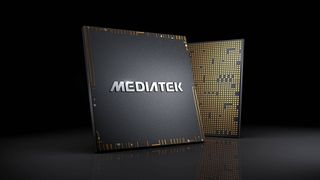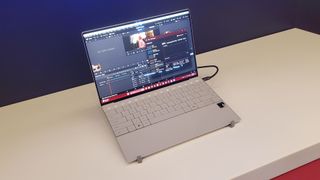MediaTek is aiming to do a Qualcomm and make Arm chips for Copilot+ PCs, targeting a 2025 release
But does this mean the Nvidia collaboration is still on or has that gone the way of the dodo?

For almost thirty years, MediaTek has been making processors and controllers for smartphones, TVs, satnavs, and all kinds of electronic devices. Now, according to one report, the Taiwan-based company is looking to produce an Arm-based CPU to compete against Qualcomm in the Copilot+ PC market, targeting a 2025 launch.
That's according to Reuters, stating that this information has come from three sources familiar with the project. In media, that phrase is commonly used to protect leakers from litigation, and given that there have also been reports that MediaTek has been working with Nvidia on a couple of projects, the information is likely to be accurate.
So why is MediaTek doing this and why only now? In the case of the latter, it's because Qualcomm has enjoyed an exclusive deal as being the only vendor of chips to be supported by Windows on Arm, a version of Microsoft's operating system that isn't x86-based. The exact details of the deal aren't publicly known but it's generally believed that the contract will end this year, paving the way for other chip manufacturers to enter the market.
Reuter's report states that MediaTek is taking a different approach to Qualcomm and rather than designing a bespoke CPU architecture based on the Arm instruction set, it's using Arm's standard layouts. In theory, that will make it cheaper and far quicker to produce, though it provides less scope for fine-tuning performance, power consumption, and so on.
But as a cheaper alternative to Qualcomm's Snapdragon X (which itself is much cheaper than chips from AMD and Intel), MediaTek's processor could do wonders for the ultra-cheap laptop market. That's normally been the preserve of basic Chrome notebooks, which are fine for doing emails and light web browsing, but little else. Something with more poke would be welcome.
One question all of this raises is does this mean MediaTek's collaboration with Nvidia is over? We've previously reported on the two companies working on a project to develop a laptop processor, so does Reuter's story mean that this is all over or is it referring to the same thing? And there's also the rumour that MediaTek and Nvidia are developing a chip for a Steam Deck-like device.
All three things may be talking about the same processor—a MediaTek-badged CPU, sporting an Nvidia GPU, with standard Arm CPU cores. Just as Qualcomm has done with Snapdragon X, the company could make several versions of the design, with the largest, most core-filled chip targeted at laptops and the smallest used in handhelds.
The biggest gaming news, reviews and hardware deals
Keep up to date with the most important stories and the best deals, as picked by the PC Gamer team.

However, Reuters claims that two of its sources said that the project referred to in its story is separate from the one with Nvidia. Since Arm designs GPUs as well as CPU cores, MediaTek doesn't need Nvidia's CUDA cores to have a super-cheap processor for budget Copilot+ PCs.
Whatever MediaTek's plans are, I don't think its designs will have much of an impact on the PC gaming market, because it's not just about the hardware—the software stack behind it all is hugely important and once you add gaming as a priority, it becomes a much bigger, and more expensive, challenge.

Best gaming PC: The top pre-built machines.
Best gaming laptop: Great devices for mobile gaming.
The real priority is emulation. One of the key selling points about the latest Copilot+ PCs is that you can pretty much run any 'normal' PC app or game on them, because underneath the hood of Windows on Arm is a software layer that translates x86 instructions into Arm ones so that they can be processed by the likes of the Snapdragon X.
We don't know what Qualcomm has done in its chip designs about this but we do know that it works pretty well, with games like Baldur's Gate 3 running very nicely on what's effectively a non-gaming laptop.
If MediaTek hopes to compete against Qualcomm, then its chip will need to be just as good when it comes to emulation, but with off-the-shelf parts, that may be a lot easier said than done.
But if MediaTek can make some headway in the Windows laptop sector, then it'll be good news for all of us, as competition breathes life into innovation and helps keep prices under control.

Nick, gaming, and computers all first met in 1981, with the love affair starting on a Sinclair ZX81 in kit form and a book on ZX Basic. He ended up becoming a physics and IT teacher, but by the late 1990s decided it was time to cut his teeth writing for a long defunct UK tech site. He went on to do the same at Madonion, helping to write the help files for 3DMark and PCMark. After a short stint working at Beyond3D.com, Nick joined Futuremark (MadOnion rebranded) full-time, as editor-in-chief for its gaming and hardware section, YouGamers. After the site shutdown, he became an engineering and computing lecturer for many years, but missed the writing bug. Cue four years at TechSpot.com and over 100 long articles on anything and everything. He freely admits to being far too obsessed with GPUs and open world grindy RPGs, but who isn't these days?
Most Popular






